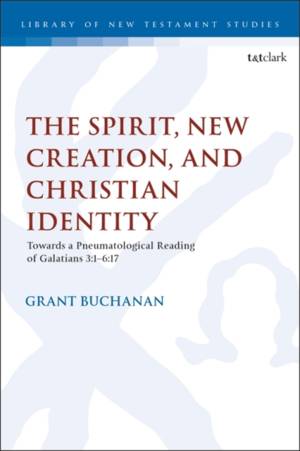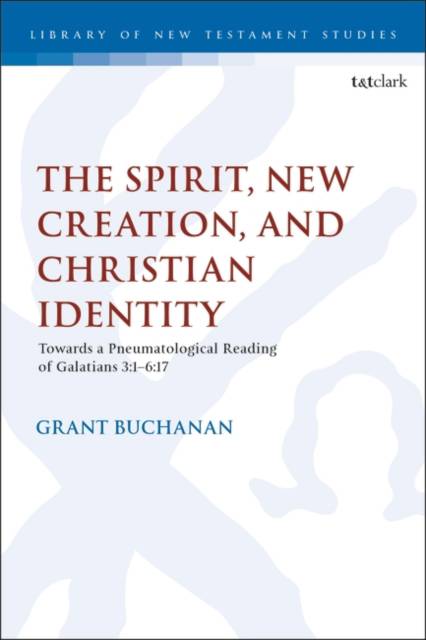
Bedankt voor het vertrouwen het afgelopen jaar! Om jou te bedanken bieden we GRATIS verzending (in België) aan op alles gedurende de hele maand januari.
- Afhalen na 1 uur in een winkel met voorraad
- In januari gratis thuislevering in België
- Ruim aanbod met 7 miljoen producten
Bedankt voor het vertrouwen het afgelopen jaar! Om jou te bedanken bieden we GRATIS verzending (in België) aan op alles gedurende de hele maand januari.
- Afhalen na 1 uur in een winkel met voorraad
- In januari gratis thuislevering in België
- Ruim aanbod met 7 miljoen producten
Zoeken
The Spirit, New Creation, and Christian Identity
Towards a Pneumatological Reading of Galatians 3:1-6:17
Grant Buchanan
€ 195,45
+ 390 punten
Omschrijving
Considering the importance of pneumatological themes for interpreting Paul's argument of Galatians, Grant Buchanan explores how Paul draws from Jewish traditions of creation and the Spirit and presents a fresh cosmogony to the Galatian church. He suggests that Galatians outlines an epistemological shift in how Paul sees past, present, and future reality in light of Christ and the presence of the Spirit in the lives of the believers. The most crucial aspect of this new cosmogony is the centrality of the Spirit in Paul's argument in Galatians 3:1-6:17, with Buchanan's exegesis revealing that the Spirit, the Galatians' identity as children of God and the new creation motif are not merely elements of Paul's argument but intrinsic to it.
Buchanan demonstrates that Paul renders Jewish and Gentile identities no longer valid, instead revealing that God's favour and election is already with them by stating that those who have the promised Spirit are all children of God. He examines Jewish biblical and Second Temple extra-biblical texts that explicitly connect the Spirit to creation themes, including Genesis, Ezekiel, the Dead Sea Scrolls and the Wisdom of Solomon. Taking Galatians 6:11-17 as the body-closing of the letter, the new creation motif directly implies the activity of the Spirit in the creation of Christian identity. Analysing 6:15 from this pneumatological perspective, Buchanan argues that the new creation motif represents a key aspect of Paul's generative cosmogony and pneumatology, indicating a far broader socio-cosmic transformation than previously assumed, and it becomes a key to understanding Paul's argument.
Buchanan demonstrates that Paul renders Jewish and Gentile identities no longer valid, instead revealing that God's favour and election is already with them by stating that those who have the promised Spirit are all children of God. He examines Jewish biblical and Second Temple extra-biblical texts that explicitly connect the Spirit to creation themes, including Genesis, Ezekiel, the Dead Sea Scrolls and the Wisdom of Solomon. Taking Galatians 6:11-17 as the body-closing of the letter, the new creation motif directly implies the activity of the Spirit in the creation of Christian identity. Analysing 6:15 from this pneumatological perspective, Buchanan argues that the new creation motif represents a key aspect of Paul's generative cosmogony and pneumatology, indicating a far broader socio-cosmic transformation than previously assumed, and it becomes a key to understanding Paul's argument.
Specificaties
Betrokkenen
- Auteur(s):
- Uitgeverij:
Inhoud
- Aantal bladzijden:
- 226
- Taal:
- Engels
- Reeks:
- Reeksnummer:
- nr. 681
Eigenschappen
- Productcode (EAN):
- 9780567709257
- Verschijningsdatum:
- 15/06/2023
- Uitvoering:
- Hardcover
- Formaat:
- Genaaid
- Afmetingen:
- 156 mm x 234 mm
- Gewicht:
- 494 g

Alleen bij Standaard Boekhandel
+ 390 punten op je klantenkaart van Standaard Boekhandel
Beoordelingen
We publiceren alleen reviews die voldoen aan de voorwaarden voor reviews. Bekijk onze voorwaarden voor reviews.









